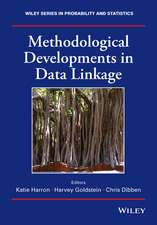New Frontiers of Molecular Epidemiology of Infectious Diseases
Editat de Serge Morand, François Beaudeau, Jacques Cabareten Limba Engleză Paperback – 28 noi 2014
| Toate formatele și edițiile | Preț | Express |
|---|---|---|
| Paperback (1) | 1160.27 lei 6-8 săpt. | |
| SPRINGER NETHERLANDS – 28 noi 2014 | 1160.27 lei 6-8 săpt. | |
| Hardback (1) | 1184.05 lei 38-45 zile | |
| SPRINGER NETHERLANDS – 10 sep 2011 | 1184.05 lei 38-45 zile |
Preț: 1160.27 lei
Preț vechi: 1221.34 lei
-5% Nou
Puncte Express: 1740
Preț estimativ în valută:
222.01€ • 232.64$ • 183.54£
222.01€ • 232.64$ • 183.54£
Carte tipărită la comandă
Livrare economică 11-25 aprilie
Preluare comenzi: 021 569.72.76
Specificații
ISBN-13: 9789400792524
ISBN-10: 9400792522
Pagini: 348
Ilustrații: VIII, 340 p.
Dimensiuni: 155 x 235 x 18 mm
Greutate: 0.49 kg
Ediția:2012
Editura: SPRINGER NETHERLANDS
Colecția Springer
Locul publicării:Dordrecht, Netherlands
ISBN-10: 9400792522
Pagini: 348
Ilustrații: VIII, 340 p.
Dimensiuni: 155 x 235 x 18 mm
Greutate: 0.49 kg
Ediția:2012
Editura: SPRINGER NETHERLANDS
Colecția Springer
Locul publicării:Dordrecht, Netherlands
Public țintă
ResearchCuprins
Preface. Introduction. Part 1 – Methods and tools in molecular epidemiolog.-1 Molecular typing of bacterial pathogens: a tool for the epidemiological study and control of infectious diseases.Part 2 – Contribution of population genetic.-2 Molecular epidemiology and evolutionary genetics of infectious diseases.-3 Population genetics and molecular epidemiology of infectious diseases. Part 3 – Contribution of population and evolutionary epidemiolog.-4 Modelling the dynamics of host-parasite interactions: basic principles.-5 Evolution of virulence: intuitions and models. Part 4 –Case studie.-6 Molecular epidemiology of tuberculosis.-7 Pneumocystis molecular phylogeny: a way to understand both pneumocystosis natural history and host taxonomy. 8 Hantavirus genetic diversity. Part 5 – New integrations.-9 Nasal methicillin-resistant coagulase-negative Staphylocococci: a reservoir of mecA gene for Staphylococcus aureus.-10 Molecular knowledge of mechanisms of helminth resistance: importance for diagnostic and epidemiology.-11 Molecular epidemiology of disease resistance genes with perspectives for researches on biological invasions and hybrid zones.-12 How does biodiversity influence the ecology of infectious disease?-13 Epidemiological interaction at the wildlife/livestock/human interface: can we anticipate emerging infectious diseases in their hotspots? A framework for building emerging diseases processes in their hot spots. Conclusion. Index.
Textul de pe ultima copertă
Molecular epidemiology has recently broaden its focuses due to the development of molecular tools but also by incorporating advances of other fields such as mathematical epidemiology, molecular ecology, population genetics and evolution. Facing new risks of emerging and re-emerging infectious diseases that are threats for humans and their livestock, the objectives of molecular epidemiology include: - the development of molecular tools, genotyping and gene expression - the incorporation of concepts and results of population genetics of infectious diseases - the integration of recent advances in theoretical epidemiology and evolutionary ecology of diseases - a better understanding of transmission for the development of risk factors analyses. This book will demonstrate how the latest developments in molecular tools and in epidemiology can be integrated with studies of host-pathogen interactions. Besides a strong theoretical component, there will also be an emphasis on applications in the fields of epidemiology, public health, veterinary medicine, and health ecology. Students and researchers in the fields of epidemiology, animal and human health, evolutionary ecology, parasitology are the main potential readers of the book, as well as a broader audience from veterinary medicine and conservation.
Caracteristici
Comprehensive review of new tools and concepts in molecular epidemiology Illustrative reviews on connecting disciplines: population biology, theoretical evolutionary epidemiology and population genetics Illustrative examples for several infectious diseases (viral, bacterial and fungal) Applications to new emerging topics such as emerging diseases in relation to global changes and drug resistance evolution Listing of evolutionary and population genetics’ concepts that apply in molecular epidemiology












